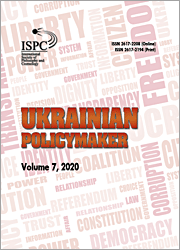Socio-Political Image of the Kyiv Philosophical School: from Internal Resistance to Open Attitude
Socio-Political Image of the Kyiv Philosophical School: from Internal Resistance to Open Attitude
Author(s): Heorhii VdovychenkoSubject(s): Philosophy
Published by: Международное философско-космологическое общество
Keywords: Ukrainian philosophy; Kyiv philosophical school; Institute of Philosophy of the Academy of Sciences of the Ukrainian SSR; Kyiv State University; “The Philosophers’ Oral Histories”;
Summary/Abstract: The article deals with the specifics of the socio-political image of the Kyiv philosophical school of the second half of the 20th century as an innovative academic project of directors of the Institute of Philosophy of the Academy of Sciences of the Ukrainian SSR, Academicians P. Kopnin and V. Shynkaruk.Their democratic vision of the foundations of educational and scientific processes in the Ukrainian SSR during the Khrushchev thaw was fruitfully embodied by the illustrious generation of the creators of thisschool or philosophers of the sixties. The study of a significant part of their memories, mainly realized in T. Chaika’s project “The Philosophers’ Oral Histories” a series of autobiographical reconstructions by Academicians S. Krymskyi, V. Horskyi, M. Popovych, as well as the ones of their colleagues S. Proleevand Y. Stratii, carried out thanks to the Student Society of Oral History of Philosophy, organized at the Department of the History of Philosophy of the Taras Shevchenko National University of Kyiv, testifies to the manifestation of a wide range of their civic stands from apolitical non-conformism to nationally oriented dissidence. An analysis of the memories of these members of the two most non-conforming departments of the said institute, namely of the History of philosophy in Ukraine and of the Logic and methodology of science, as well as the memoirs of their colleagues, primarily V. Lisovyi, allows us to recognize the Kyiv philosophical school as a domestic academic micromodel-prototype of an open society with its apparent: democracy, opposition to xenophobia, primarily to anti-Semitism and Ukrainophobia,resistance to official dogmatization of state ideology, openness to international experience in the context of direct dialogue and, which is fundamentally important, awareness of their role in the study and preservation of the spiritual, primarily philosophical, experience of the Ukrainian people and all ethnic groups in Ukraine.
Journal: Ukrainian Policymaker
- Issue Year: 7/2020
- Issue No: 7
- Page Range: 83-96
- Page Count: 14
- Language: English

